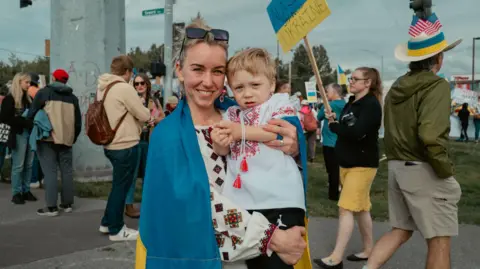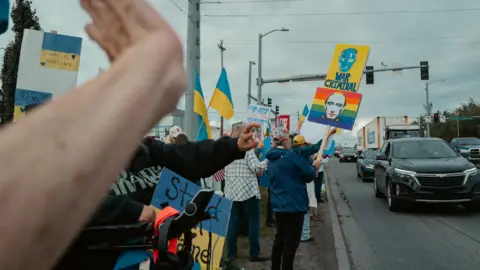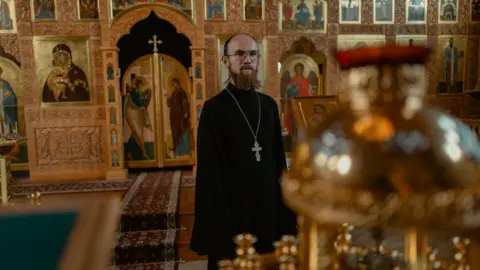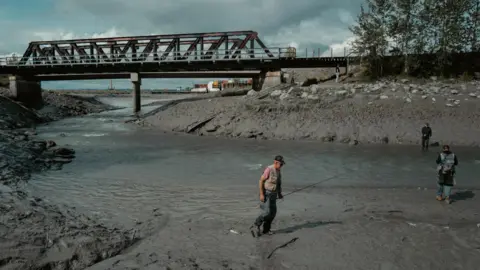ARTICLE AD BOX
Jake Lapham
BBC News in Anchorage

 BBC
BBC
Hanna Correa and her son Milan attend a protest in Anchorage
"Putin is supposed to be in jail, and he just comes to Alaska like that."
Hanna Correa is amongst a sea of Alaskans waving Ukrainian flags on road leading into the capital city, Anchorage.
"When I entered through that parking lot, and I see a lot of Americans, they're supporting, it made me cry," she says.
Ms Correa, 40, left Ukraine in 2019 for love, and six years later, the future of her country could be decided in her adopted home town.
US President Donald Trump and his Russian counterpart Vladimir Putin are set to touch down at Joint Base Elmendorf-Richardson, a 30 minute drive away. Ukraine's leader Volodymyr Zelensky is not invited, something Ms Correa says is "pretty sad".
Among those protesting their arrival is Christopher Kelliher, a 53-year-old military veteran and Alaskan native.
"It's gross, it makes you want to take a shower," he says of the meeting.
"Putin doesn't need to be in our state, much less our country. We have an idiot in the White House that will kowtow to this guy."


Hundreds lined a street in Anchorage on Friday to oppose Putin's arrival
This region's history with Moscow gives Friday's summit added significance. The US purchased Alaska from the Russians in 1867 for $7.2m (£1.48m).
Critics called the purchase 'Seward's Folly', arguing the land amounted to a frozen wasteland. But later discoveries of rare earth minerals and abundant oil and gas put paid to that label.
Ornate churches are among the most visible symbols of Alaska's Russian heritage. The St Tikhon Orthodox Church in Anchorage has been holding three days of prayer ahead of leaders' arrival.
Priest Nicholas Cragle, an American who recently moved to Alaska after living in Russia for seven years, says the conflict is "particularly painful and close to the hearts" of parishioners.
"We're hoping that this meeting will lead to something... lead to a culmination of this conflict," says Mr Cragle.


Nicholas Cragle has settled in Anchorage with his wife, who he met in Russia
That feeling is shared by fishermen ankle-deep in creek bed on the outskirts of town, drawn to the area by the allure of some of the world's finest salmon.
"I think it's a good idea [the summit], I wish Zelensky would be out here too... get this thing over with," says Don Cressley, who lives in the Alaskan city of North Pole and is visiting on a fishing trip with his grandson.
He wants an end to the war "because of the destruction they're doing to all the cities, all the buildings, making everybody more homeless, taking their foods away, their supplies away, their living right away,".
Donald Trump, he says, is doing an "awesome job" in ceasefire negotiations.


Alaska draws fisherman in search of some of the world's best salmon
While the US president often talks warmly of his relationship with Vladimir Putin, superpower tensions persist and are more keenly felt here.
Moscow's military planes are routinely detected flying near the coast of Alaska. And in January, Canadian and American fighter jets were scrambled after multiple Russian jets were spotted in the Arctic, according to the North American Aerospace Defence Command.
That breeds a sense of unease for some Alaskans who live closer to Russia than Washington DC.
"Although the Cold War is over between Russia and the US, they're constantly patrolling our airways," Anchorage resident Russell Wilson tells me while fishing.
"If the president doesn't put the hammer down, we could be the next Ukraine."
However other Alaskans consider a return to Cold War hostilities are far-fetched fantasy.
I ask Army veteran Christopher Kelliher if he is concerned about a Russian invasion. "Not really, everybody in Alaska owns a gun," he replies.

 1 hour ago
3
1 hour ago
3








 English (US) ·
English (US) ·